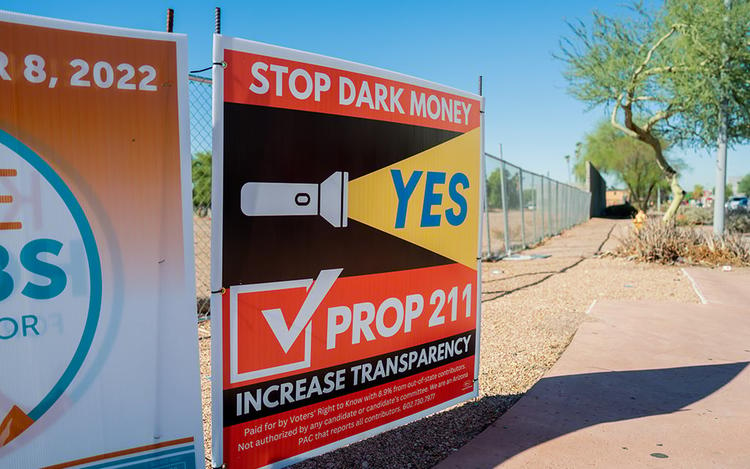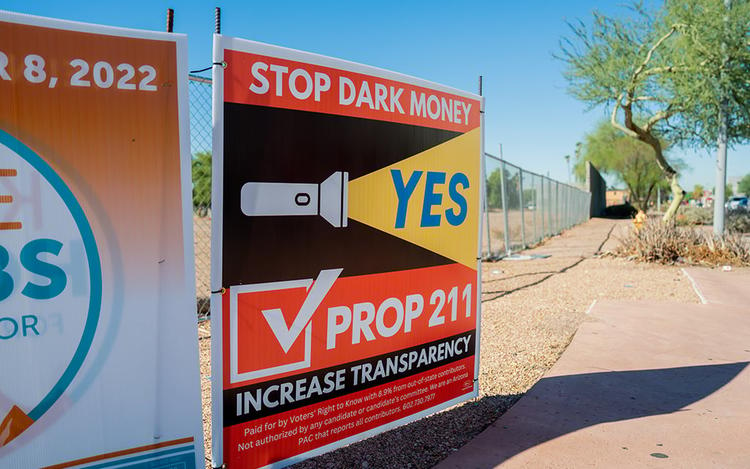By Emilee Miranda | –
( Cronkite News) – WASHINGTON – It could be months before the impact of Proposition 211 is seen in Arizona, but experts are already hailing the new law aimed at exposing “dark money” in politics as a model for the rest of the nation.
“Other states have passed laws that aim to address secret spending, but Prop 211 puts Arizona at the forefront of securing voters’ right to know … and Prop 211 is a model for other states to follow,” said Patrick Llewellyn, director of state campaign finance at the Campaign Legal Center.
But what Llewellyn is calling a model, critics are calling a free speech threat. Opponents went to court last week to block what they call an unconstitutional law that will chill free speech, by exposing donors who want their identities kept secret to “retaliation and harassment” for giving to certain causes.
“Prop 211 is styled the ‘Voters’ Right to Know Act,’ but that is a misnomer,” said the suit filed in Maricopa County Superior Court last Friday by the Goldwater Institute. “Voters only get to know who felt comfortable subjecting themselves to the Act’s identity and financial reporting requirements when communicating their political views; voters do not get to know who the Act silenced. That is backwards.”
Samantha Chow/ Cronkite News
Proposition 211 requires that independent organizations – whether an individual or a group – that spend $50,000 or more in an election cycle to support or oppose a candidate or issue in a statewide race must identify any donors who gave $5,000 or more. The trigger for disclosure in local campaigns, such as city council or school board races, is $25,000.
Currently, those outside groups have to report their spending on a campaign, but not where the money came from – hence the term “dark money.”
“Secret spending in elections is a growing problem and that’s not going away,” Llewellyn said. “So we need real transparency about who’s spending big money on elections to reduce the influence of wealthy special interests, and that’s what Prop 211 provides for Arizona voters.”
Arizona voters apparently agreed, approving Proposition 211 by an overwhelming 72.3% to 27.7%, the widest margin of victory of the 10 statewide ballot questions this fall. Almost 1.74 million people voted for the measure, also known as the Voters’ Right to Know Act, compared to 664,111 who voted against it.
That was a sharp change for the measure, which failed to get enough signatures to make it onto the ballot in two previous tries.
Critics raised concerns before this election that, far from leading to transparency, Proposition 211 could end up silencing voters’ voices by making people hesitant to support issues out of fear of retaliation.
Scot Mussi, president of the Arizona Free Enterprise Club said before the election that the dark money measure is not about “trying to provide information to the voters about what’s going on in our elections. We believe the result will be that this information in elections can be used to target, harass and intimidate people … simply because of the causes and issues they want to support.”
The Free Enterprise Club is one of the plaintiffs in the Goldwater Institute suit, along with the Center for Arizona Policy and two unnamed donors, Does I and II, who have “a history of giving to charitable organizations” with the expectation that their identities will be kept private.
The unnamed donors fear that revealing their identities will subject them to “a risk of ‘serious physical harm,’ and includes economic, reputational, and other forms of harassment and retaliation.” That will cause them to stop giving, the suit says, which will, in turn, harm the Free Enterprise Club and the Center for Arizona Policy.
That is not a fear for Pinny Sheoran, president of the League of Women Voters of Arizona and a strong backer of shining light on dark money transactions.
“By having to declare where the original source of the money is, we may be in a better place to identify money from outside the country or even outside the state,” Sheoran said.
She said she is less concerned about abuse of the law than she is about a possible lack of enforcement. Sheoran said she has not seen any indicator or clear guidelines on how the Citizens Clean Elections Commission – which the proposition names as the enforcing authority – plans to ensure compliance.
“If the Clean Elections Commission is a strong body, then it will be enforced appropriately,” Sheoran said. “If it isn’t, then we have to see what happens, then the citizens will have to take it as the law and bring forward violations.”
Under the new law, anyone who violates the disclosure requirement could be fined at least the amount they failed to report, and potentially as much as three times that amount. That money would be put into a fund that the Clean Elections Commission could use to enforce the law.
It could be some time before the law is tested, with the next round of statewide elections not coming until 2024, when state legislators will be up for reelection. But supporters are optimistic.
Llewellyn said he is hopeful the Clean Elections Commission will find a way to both implement and enforce the law. In the meantime, he will encourage other states lacking campaign finance disclosure laws on dark money to look at the Arizona model.
“The goal of Prop 211 and the goal of campaign finance disclosure is to make sure that voters have the information they need to weigh and evaluate the messages they’re receiving,” Llewellyn said.
“Prop 211 provides Arizona voters with real transparency about who’s spending big money to influence their vote, by ensuring that big political spenders in Arizona disclose where their money is really coming from,” he said.
News Broadcast Reporter, Washington, D.C.
Emilee Miranda expects to graduate in December 2022 with a master’s degree in mass communication. Miranda has reported on migration in Tapachula, Mexico, for the Cronkite Borderlands Project.
Via Cronkite News





 © 2025 All Rights Reserved
© 2025 All Rights Reserved